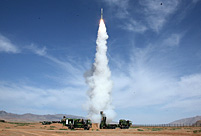The central government's move to fight corruption in the oil and gas industry will accelerate the reform of China's energy sector and improve the corporate management of State-owned enterprises, experts said.
On Sept 1, China's top discipline watchdog said authorities are investigating Jiang Jiemin, the former head of the State assets regulator.
Jiang, the former chairman of the State-owned Assets Supervision and Administration Commission, SASAC, is being probed for "grave discipline violations”, which usually refers to corruption, according to a statement by the Central Commission for Discipline Inspection.
He was named as the head of SASAC in March after serving as chairman of China National Petroleum Corp, the country's largest oil and gas company, for about two years.
Jiang, 58, was the first company executive to be promoted to the position, rather than a government official.He became the third chief in charge of SASAC that was established in 2003 to regulate 118 central State-owned enterprises.
Jiang became chairman of CNPC in April 2011. After joining Shandong Shengli Oilfield Co as a technician in 1972, he worked in the petroleum industry, apart from four years as vice-governor of Qinghai province between 2000 and 2004.
Jiang's probe is mainly related to his previous working experience in CNPC rather than in SASAC. Just a few days before his investigation was announced, another four top executives at the vice-president level in the company were reported to have been put under investigation and resigned from their posts.
Wang Yongchun, deputy general manager of CNPC; Li Hualin, vice-president of PetroChina, CNPC's listed unit; Ran Xinquan, vice-president of PetroChina; and Wang Daofu, PetroChina's chief geologist, are being investigated for suspected corruption by the CCDI.
"The series of corruption probes in CNPC may improve the energy companies' reform process and bring management changes,"said Lin Boqiang, director of the Xiamen-based China Center for Energy Economic Research.
He said it is usually a long-term process for energy companies in developing countries to become mature in their corporate management structure.
 |
 Storms leave 97 dead, 58 missing in Mexico
Storms leave 97 dead, 58 missing in Mexico New model of indigenous surface-to-air missiles testfired
New model of indigenous surface-to-air missiles testfired  118.28-carat diamond to be auctioned in HK
118.28-carat diamond to be auctioned in HK Maternal love under streetlight
Maternal love under streetlight Naked foreign student sits in the middle of a road in Haikou
Naked foreign student sits in the middle of a road in Haikou  Colorful Yunnan: Enjoy the natural beauty
Colorful Yunnan: Enjoy the natural beauty Harbin named Chinese city with most beautiful women
Harbin named Chinese city with most beautiful women New college students' military training in Guangzhou
New college students' military training in Guangzhou Rugby girls
Rugby girls PLA's 38th Group Army conduct training
PLA's 38th Group Army conduct training Residences of the royal house of Savoy
Residences of the royal house of Savoy The last days of Wan Aihua
The last days of Wan Aihua Highlights at 12th National Games of China
Highlights at 12th National Games of China Beijing Film Academy welcomes freshmen
Beijing Film Academy welcomes freshmen Large mahjong party sets new world record
Large mahjong party sets new world recordDay|Week|Month